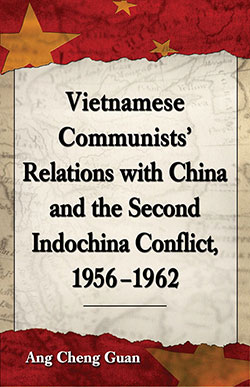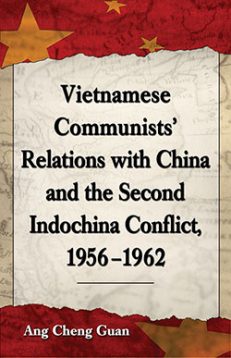Vietnamese Communists’ Relations with China and the Second Indochina Conflict, 1956–1962
$29.95
In stock
About the Book
According to the final declaration of the 1954 Geneva Conference, general elections were to be held in July 1956 that would lead to the reunification of North and South Vietnam. The Geneva agreement was, however, doomed from the start, as the South Vietnamese leaders did not suscribe to it and the leaders of the Communist North saw its value primarily as propaganda. By 1956 it was obvious that reunification was impossible, and the North Vietnamese looked to China for advice and assistance.
Based on Vietnamese, Chinese, American and British sources—many only recently made available—this work examines Sino-Vietnamese relations in the early stages of the second Indochina conflict and reveals that the Hanoi government was remarkably in control of its own decision-making.
About the Author(s)
Bibliographic Details
Ang Cheng Guan
Format: softcover (5.5 x 8.5)
Pages: 331
Bibliographic Info: notes, bibliography, index
Copyright Date: 2012 [1997]
pISBN: 978-0-7864-7373-1
eISBN: 978-1-4766-2690-1
Imprint: McFarland
Table of Contents
Acknowledgments v
List of Abbreviations ix
Introduction 1
1. January 1956–July 1956 11
2. August 1956–December 1956 31
3. January 1957–December 1957 49
4. January 1958–December 1958 73
5. January 1959–May 1959 93
6. May 1959–December 1959 115
7. January 1960–July 1960 133
8. August 1960–December 1960 155
9. December 1960–October 1961 179
10. October 1961–July 1962 205
Conclusion 231
Notes 237
Bibliography 291
Index 315
Book Reviews & Awards
“most welcome…the author has succeeded in doing what he set out achieve…the author goes deeply into events in Indochina and draws a very detailed picture of the situation in those years on the Communist side…highly recommended…valuable in shedding much-needed light on the Communist side of the Second Vietnam War during its early stage”—Crossroads: An Interdisciplinary Journal of Southeast Asian Studies; “valuable…the author does an excellent job of surveying the period”—The China Quarterly.






